What is VPS Hosting?
Well, if you run a website that is starting to get some serious traffic, you may be starting to feel the limitations of shared hosting — sites loading slowly, reaching resource limits, or sudden spikes in visitors overwhelming your server are all signs it may be time to upgrade.
But do you really need a dedicated server costing hundreds per month? For most site owners, the answer is No.
A VPS strikes the perfect balance, giving you guaranteed resources at an affordable price point.
In this post, we’ll cover everything you need to know as a beginner about Virtual Private Server (VPS).
Let’s start with the basics – what exactly is a VPS?
Table of Contents
What is VPS Hosting?
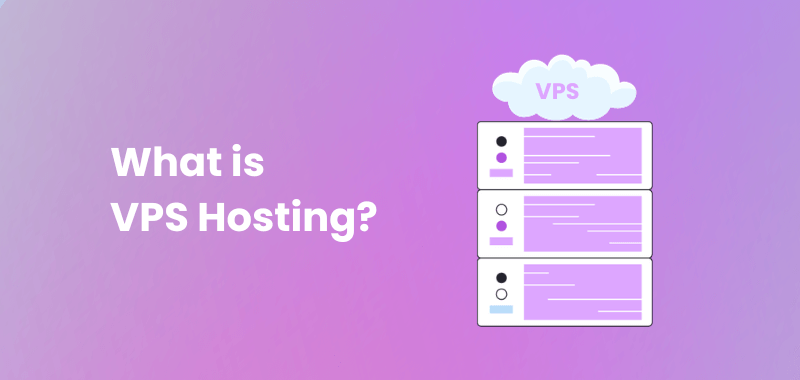
VPS, short for Virtual Private Server, provides users with their own dedicated virtual server, offering more flexibility, customization, and better performance compared to shared hosting.
As opposed to sharing resources on a single server like with shared hosting, your website lives on its own virtual machine with VPS hosting.
This means you get full root access and control to customize the operating system, software, and configurations based on your specific needs.
Whether you need to install certain applications or change the server setup, you have the capability with your VPS. It enables you to have a highly personalized environment tailored for your web projects and applications.
How Does VPS Hosting Work?
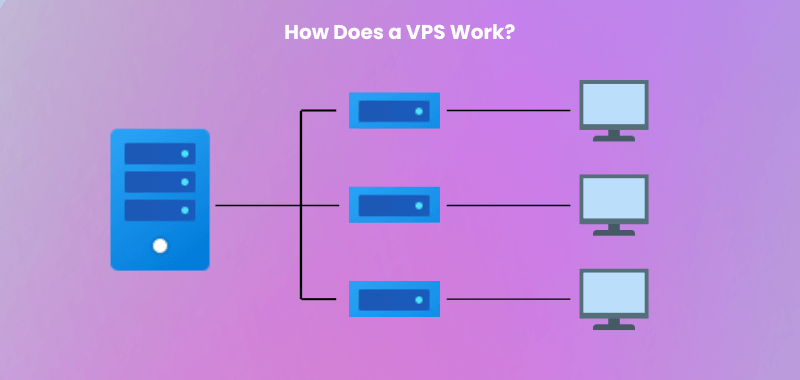
VPS hosting uses virtualization technology to create separate virtual servers on a physical server.
Even though the physical server is shared, VPS makes it seem like you have your own dedicated server.
The hosting provider installs a software layer that divides the physical server into separate compartments for each user. Each compartment acts like an independent virtual server with its own operating system and resources.
Within your virtual server, you can install software like Linux, MySQL, and cPanel to host your website. The virtualization ensures you get guaranteed resources like memory, disk space, CPU cores, etc.
Unlike shared hosting where website performance depends on how much resources other sites use, VPS gives you dedicated resources just for your site.
So VPS gives you the experience of having your own private environment and dedicated resources through virtualization technology.
Your website lives in a secure, isolated container and does not share resources with others.
What are the Types of VPS hosting?
There are three main types of VPS hosting.
1. Unmanaged VPS Hosting Gives You Control
If you’re technically skilled and like being in charge, unmanaged VPS hosting is likely the best fit for you.
Here’s the deal with unmanaged VPS hosting:
The hosting provider sorts out the physical server hardware and keeps it up—but that’s about it. You take over all other management duties and have complete control to configure your VPS however you want. So with great power comes great…responsibility.
You’ll need to handle critical tasks like:
- Monitoring server resources and performance
- Installing software and applications
- Managing security protocols and updates
- Configuring the operating system and more
It’s more work, but here are some perks:
- Maximum flexibility to customize your VPS
- Lower monthly costs than managed options
- Opportunity to fine-tune performance
So if you’ve got the technical chops to operate your own server, unmanaged VPS puts you fully in charge.
2. Managed VPS = Hands-Off Convenience
If hardcore system administration sounds like your worst nightmare, managed VPS hosting takes over that headache so you don’t have to worry.
With managed VPS hosting, your web host handles pretty much everything behind the scenes:
- Monitoring and optimizing server resources
- Installation, updates, and security
- Troubleshooting issues
- Backups and restores
This hands-free approach means you can focus on your business instead of technical server stuff. Though it does cost more than unmanaged options.
Key perks include:
- No technical expertise needed
- 24/7 expert support
- Increased security and reliability
- Easy scalability
So if you want convenience without the systems admin role, managed VPS lets web hosts handle the geek stuff.
3. Semi-Managed Balances Control and Support
If unmanaged and managed VPS hosting both have deal-breaker downsides for you, semi-managed splits the difference.
With semi-managed VPS hosting you get:
- OS updates, security patches, server monitoring
- Assistance with server failure issues
- Installation of core software
But you’ll still need to handle critical day-to-day operations like: configurations, performance optimization, application installation, and resource allocation.
So what are the upsides to middle-ground semi-managed hosting?
- More support than unmanaged
- More customization than fully managed
- Lower cost than fully managed
This combo allows you to offload some complex tasks while still maintaining control.
Now you’ve got the basics on picking VPS hosting options. Just decide if you want total control, max convenience, or a middle option based on your preferences, skills, and budget.
Here is a detailed comparison of shared hosting, VPS hosting, and dedicated hosting.
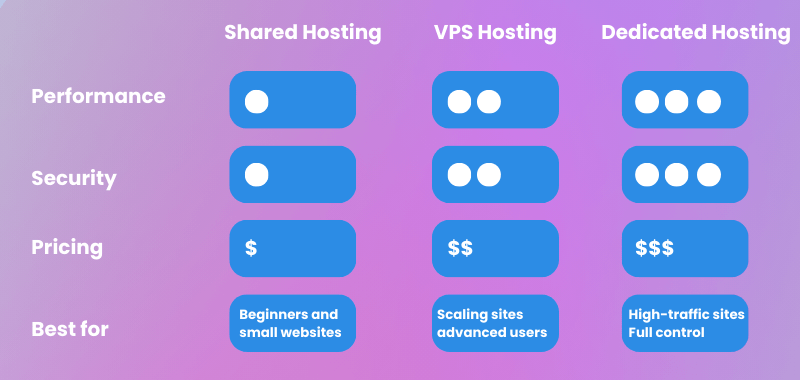
Shared Hosting
- Multiple websites are hosted on the same physical server and share resources like CPU, RAM, and storage. This allows the costs to be split among website owners.
- Shared hosting plans are the most affordable starting point for new websites and blogs. Plans often cost just a few dollars per month.
- Performance can be inconsistent since websites are competing for the same pool of resources. If other sites on the server experience a traffic spike, it can slow down your site.
- Limited ability to customize the server configuration or software. You get what the hosting provider offers.
- Shared hosting works well for personal websites, small blogs, and sites with low monthly traffic. As a site grows, shared resources may become insufficient.
VPS (Virtual Private Server) Hosting
- Websites are hosted on virtual machines that share the same physical server. Resources like CPU, RAM, and storage are virtually partitioned.
- You get dedicated resources for your website without having to pay for a full dedicated server. Costs are lower than dedicated hosting.
- Ability to customize and control the virtual machine’s software since you’re not sharing a server configuration.
- Scalability to add more resources like RAM and CPU as needed. Useful for sites expecting traffic growth.
- No resource competition with other sites since your site has dedicated resources. Provides more consistent performance.
- A good middle option between shared and dedicated hosting, suitable for medium-traffic sites.
Dedicated Hosting
- Your website gets its own physical server not shared with any other sites. Full control over the server’s resources.
- Most expensive option but provides unmatched performance, speed, and customization capabilities.
- Ideal for high-traffic sites, web apps, e-commerce stores, or sites with specific software needs.
- You can customize the server’s operating system and optimize hardware for your site’s needs.
- No resource conflicts with other sites allow for maximum performance and uptime.
- Dedicated hosting provides the ultimate flexibility and reliability for large, complex sites.
Overall, shared hosting is the affordable starting point for most websites, while dedicated servers offer total control and customization for more demanding sites. VPS hosting strikes a balance between cost and customization.
Pros and Cons of VPS Hosting
A VPS provides more flexibility, customization, and dedicated resources compared to shared hosting, but without the high cost of dedicated servers.
Some key advantages of VPS Hosting are:
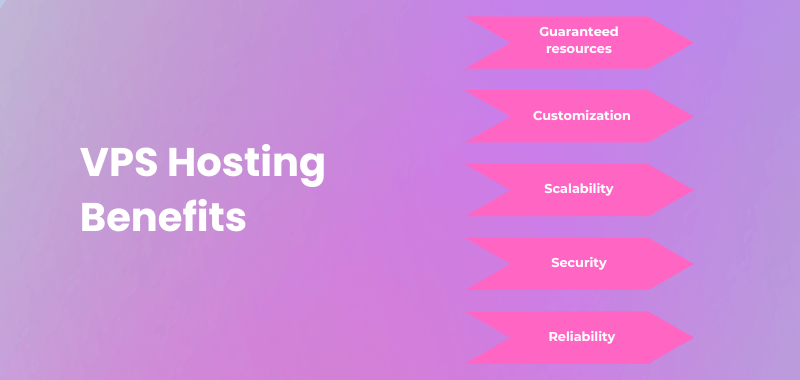
1. Guaranteed resources
You get your own allocated CPU, RAM, and storage instead of competing with other sites for shared resources. This improves performance.
2. Customization
You can install software, choose your operating system, and configure the server to suit your site’s needs.
3. Scalability
It’s easy to upgrade your VPS plan’s resources if your site grows. No need to switch hosting plans.
4. Security
Your site is isolated from other sites on the physical server, minimizing security issues.
5. Reliability
If one node goes down, your VPS can fail over to backup nodes, meaning higher uptime.
The downsides mainly relate to the increased complexity:
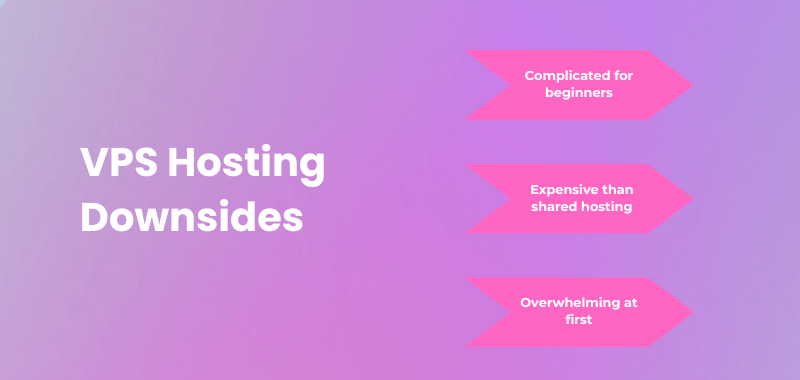
1. Can be complicated for beginners
Managing the server requires some technical skills. You may need to pay for expert assistance.
2. More expensive than shared hosting
The guaranteed resources come at a higher cost, especially when starting out.
3. Overwhelming at first
It offers lots of great features, but you need to make sure VPS actually fits your needs.
The key is making sure the benefits fit your use case. VPS brings more control and customization for sites needing dedicated resources, at an affordable price point vs dedicated servers.
When to Use VPS Hosting?
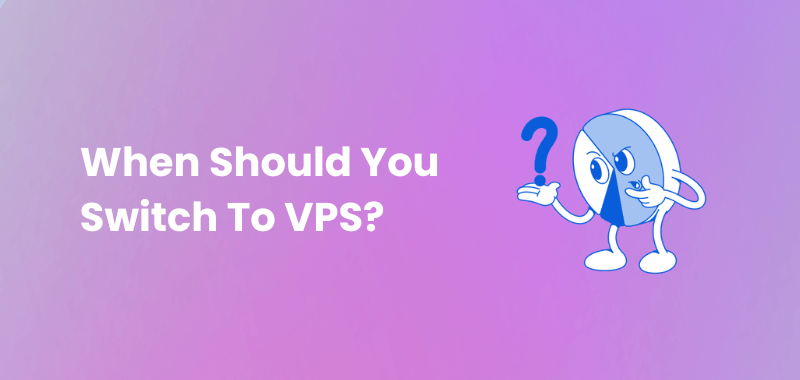
So you started your website using shared hosting. It was affordable and got the job done.
But now your site is getting more popular and running into some problems. Should you switch to VPS hosting?
Here are three signs it could be time to upgrade.
1. Handle more website traffic
Say your food blog is taking off. You’re getting featured and traffic is booming. But readers complain pages take forever to load.
With shared hosting, 50+ websites use the same server. When traffic spikes across sites, they all slow down—like 50 cars cramming onto a two-lane road.
With VPS hosting, your site lives on its own dedicated virtual server with guaranteed resources. So it stays speedy even when traffic jumps. It’s like having a 6-lane highway to yourself.
2. Limited Customization
Maybe you sell homemade soaps on Shopify. You want to integrate accounting software to track supply orders and sales.
But your shared host blocks installing certain apps. Their one-size-fits-all servers limit customization.
With VPS you control the server. You can install and integrate the exact tools you need for your business to thrive.
3. Crashing Errors
Suppose your small jewelry e-commerce site lets shoppers design custom bracelets online. However, the complex customization features overload the limited shared hosting server, causing frequent crashes.
Frustrated shoppers email you, unable to complete their custom designs due to site errors and crashes. These issues are negatively impacting your online sales and reputation!
With a VPS (Virtual Private Server), your e-commerce site would live on its own robust server with resources to handle traffic spikes. Customers could smoothly design one-of-a-kind bracelets without interruptions.
If your shared hosting site struggles with add-on features like customization, upgrading to a VPS can provide the power and flexibility needed to grow.
How to Pick the Best VPS Hosting Plan for Your Website?
Here are some tips for choosing the best VPS hosting plan for your website.
1. Decide between self-managed or fully managed VPS
Self-managed VPS gives you server access to configure yourself, while managed hosts handle technical aspects for you. Managed hosting is easier if you don’t have server admin skills.
2. Choose Linux or Windows OS
Most VPS plans offer Linux distributions like Ubuntu or CentOS which are open-source, secure, and reliable. Go with Windows only if you need it for specific software.
3. Ensure high uptime
Look for guaranteed 99.9-100% uptime in the SLA and features like load balancing and redundancy for maximum reliability.
4. Match VPS hardware to your resource needs
Pick a plan with adequate RAM, fast SSD storage, multiple cores, and abundant bandwidth to run your site smoothly, with room to scale up.
5. Get 24/7 customer support
Issues can happen anytime so choose a provider with round-the-clock support via phone, chat, and tickets.
6. Automated backups are essential
Daily or weekly backups should be included to safeguard your data. Verify backup frequency and retention period.
7. Check reviews and reputation
Go with an established provider known for excellent technical support, uptime, and transparent pricing. Avoid hosts with many negative reviews.
8. Price and plan options
Compare prices of different plans with varying amounts of resources to get the best value.
Following these tips will help you select a reliable and high-performing VPS suitable for your website’s growth and traffic needs.
FAQs
Here are the most frequently asked questions about Virtual Private Server, also known as a VPS.
VPS hosting is typically used for sites that need more resources and flexibility than shared hosting, but aren’t big enough yet for a dedicated server.
VPS is better than shared web hosting when you need isolated resources and custom server controls, but is overkill for basic websites with low traffic.
If your site has outgrown shared hosting limitations or requires specific configurations, features, or resources, shifting to VPS can be worthwhile.
VPS security is generally better than shared hosting since your site runs isolated from other sites, minimizing vulnerabilities.
Compared to dedicated servers, VPS is cheap but costs more than shared hosting depending on allocated resources. Plans scale to fit different budgets.
Also Read:
- What is Cloud Hosting? A Beginner’s Guide for 2024
- Best Web Hosting Providers in 2024 (For Small & Growing Businesses)
- Best Managed WordPress Hosting for Maximum Performance in 2024
- Top Reliable Web Hosts to Get Free .Com Domain for 1 Year in 2024
- Best Podcast Hosting 2024 to Create & Monetize Your Podcasts
- Managed Hosting vs Shared Hosting: Which Is The Best Fit For Your Website In 2024?
- Best Web Hosting Deals 2024: Save up to 90% on Reliable Services
- Top Sites To Buy Expired Domains in 2024
- Best Web Hosting Free Trials in 2024
Final Thoughts on VPS Hosting
As your website grows and expands, at some point shared hosting will reach its limitations for serving your increasing needs.
When your site starts experiencing slowdowns, customization restrictions, and crashes, it signals that an upgrade to VPS hosting may be necessary.
While more complex and expensive, VPS provides your site with dedicated resources isolated from other sites, boosting performance, reliability, and flexibility.
Before considering the high costs of dedicated servers, VPS offers an affordable middle-ground between basic shared hosting and top-tier dedicated hosting.
Carefully weigh if VPS matches your technical capabilities and fits your growth requirements. With clear expectations set, transitioning to VPS positions growing sites for long-term success and scalability.